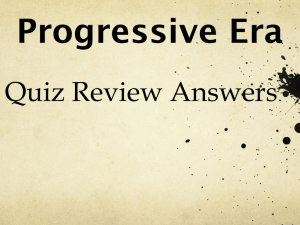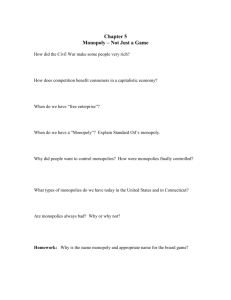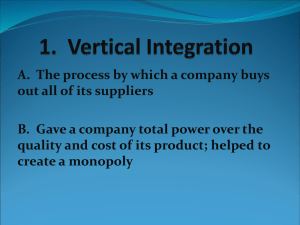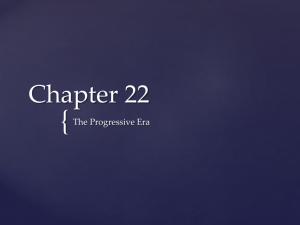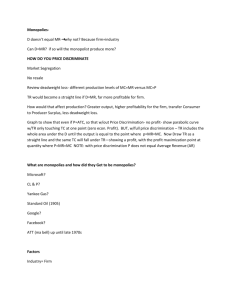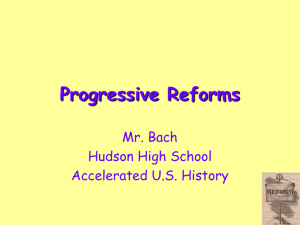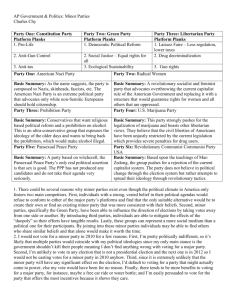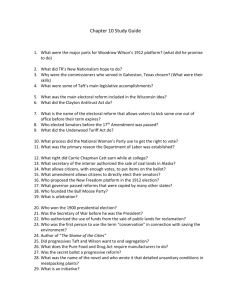Review Guide
advertisement
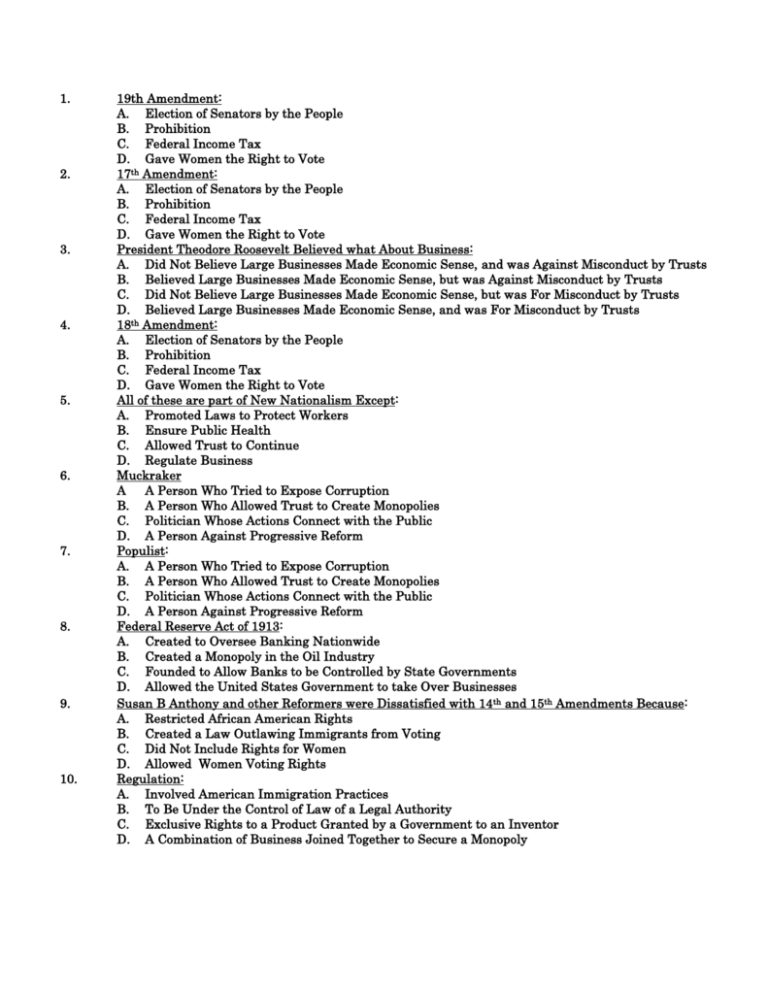
1. 2. 3. 4. 5. 6. 7. 8. 9. 10. 19th Amendment: A. Election of Senators by the People B. Prohibition C. Federal Income Tax D. Gave Women the Right to Vote 17th Amendment: A. Election of Senators by the People B. Prohibition C. Federal Income Tax D. Gave Women the Right to Vote President Theodore Roosevelt Believed what About Business: A. Did Not Believe Large Businesses Made Economic Sense, and was Against Misconduct by Trusts B. Believed Large Businesses Made Economic Sense, but was Against Misconduct by Trusts C. Did Not Believe Large Businesses Made Economic Sense, but was For Misconduct by Trusts D. Believed Large Businesses Made Economic Sense, and was For Misconduct by Trusts 18th Amendment: A. Election of Senators by the People B. Prohibition C. Federal Income Tax D. Gave Women the Right to Vote All of these are part of New Nationalism Except: A. Promoted Laws to Protect Workers B. Ensure Public Health C. Allowed Trust to Continue D. Regulate Business Muckraker A A Person Who Tried to Expose Corruption B. A Person Who Allowed Trust to Create Monopolies C. Politician Whose Actions Connect with the Public D. A Person Against Progressive Reform Populist: A. A Person Who Tried to Expose Corruption B. A Person Who Allowed Trust to Create Monopolies C. Politician Whose Actions Connect with the Public D. A Person Against Progressive Reform Federal Reserve Act of 1913: A. Created to Oversee Banking Nationwide B. Created a Monopoly in the Oil Industry C. Founded to Allow Banks to be Controlled by State Governments D. Allowed the United States Government to take Over Businesses Susan B Anthony and other Reformers were Dissatisfied with 14 th and 15th Amendments Because: A. Restricted African American Rights B. Created a Law Outlawing Immigrants from Voting C. Did Not Include Rights for Women D. Allowed Women Voting Rights Regulation: A. Involved American Immigration Practices B. To Be Under the Control of Law of a Legal Authority C. Exclusive Rights to a Product Granted by a Government to an Inventor D. A Combination of Business Joined Together to Secure a Monopoly 11. 12. 13. 14. 15. 16. 17. 18. 19. 20. Who Helped Immigrants find Improvements in Life, while Still Allowing for Corruption A. Standard Oil B. Carnegie Steel C. Vanderbilt Railroad Company D. Political Bosses 16th Amendment: A. Election of Senators by the People B. Prohibition C. Federal Income Tax D. Gave Women the Right to Vote This State Became a Model for Factory Reforms: A. Massachusetts B. New Jersey C. Illinois D. New York Square Deal A. Allowed Monopolies in the Steel Industry B. Wanted No Government Intervention in the Economy C. Progressive Reforms Designed to Protect People from Big Businesses D. Reforms for Women’s Rights Lead to Major Improvements in Factory Safety: A. Homestead Strike B. Great Railway Strike of 1877 C. Triangle Shirtwaist Factory Fire D. Haymarket Riot New Freedom A. Allowed the North all Industrial Rights in the United States B. Regarded the Establishment of Women’s Voting Rights C. Called for an Establishment of the National Parks System D. Called for an America Free From the Domination of Big Business and Government All of these were Major Areas Targeted for Reform by Progressives Except: A. City Life B. Moral Reform C. Racial Discrimination D. Industrial Growth Clayton Anti-trust Act A. Was Enacted to Allow Monopolies and Trust in Businesses B. Was Enacted to Stop Monopolies and Trust in Businesses C. Allowed Standard Oil to Further Economic Dominance over the Oil Industry D. Federal Government Allowed Trust in the South Conservation Movement: A. Allowed Businesses to Operate on Government Property B. Create a Cooperative Between Business and the Government C. Created the Women’s Suffrage Movement D. Focused on the Creation of the National Parks System Booker T. Washington Majorly Supported Reforms in Which Two Areas: A. Women’s Education and Government Funding B. Vocational Training and A Reliance on the Government C. Vocational Training and Economic Self-Reliance D. Economics and Science 21. 22. 23. 24. 25. 26. 27. 28. 29. 30. Following WWI, Women Pressed for Voting Rights because of Their: A. Fighting on the Front Line B. Help with Establishing the 14th and 15 Amendments C. Work in Factories and Care for Homes During the War D. Economic Dissolution of Poverty A Response to the book The Jungle was: A. New Freedom Act B. Federal Reserve Act of 1913 C. Coal Strike of 1902 D. Meat Inspection Act These were Acts Associated with Reform in the Railroad Industry : A. Elkins Act and Hepburn Act B. New Freedom and Federal Reserve Act of 1913 C. Monopoly Act and Meat Inspection Act D. Square Deal and New Deal All of these were Reforms for City Life Except: A. Rural Reform B. Garbage Collection C. City Beautification D. Building of Playgrounds Jacob Riis is Known For: A. Reformer for the Public’s Involvement in Politics B. Involvement in the Standard Oil Company C. His Photographic and Journalistic Talents to help the Impoverished D. Involvement in America’s National Park System Robert La Follette is Known For : A. Reformer for the Public’s Involvement in Politics B. Involvement in the Standard Oil Company C. His Photographic and Journalistic Talents to help the Impoverished D. Involvement in America’s National Park System Ida Tarbell wrote About the Monopoly in what Industry: A. Steel B. Oil C. Railroad D. A Series of Nation-Wide Centralized Exercises in Rapid Development in the United States Initiative: A. A Vote on a Bill Started by the People B. Voters Can Remove Officials from Office C. A Bill Started by the People D. A Contract Between the People and the Government Referendum: A. A Vote on a Bill Started by the People B. Voters Can Remove Officials from Office C. A Bill Started by the People D. A Contract Between the People and the Government Recall Election: A. A Vote on a Bill Started by the People B. Voters Can Remove Officials from Office C. A Bill Started by the People D. A Contract Between the People and the Government 31. 32. 33. 34. 35. The 1902 Coal Strike was Significant Because: A. Federal Government Decided to Stay Out of Business B. The Government Decided Not to Rule on Decisions Concerning the Private Market C. The States Would Be Solely Responsible for Business Decisions D. Federal Government will Intervene in Business The Government Leaning Away from Laissez-Faire Economics meant: A. The Government Would Allow Monopolies to Exist B. The Government Would Allow Capitalistic Business Practices C. The Government Would Be Involved in Business Practices D. The Government Allowed the Business Market to Control Policies What Replaced Focus from the Progressive Movement: A. Women Suffrage Movement B. African-American Rights Movement C. Nazism D. World War I The Bull-Moose Party was Based On: A. Only the Women’s Rights Movement B. Big Businesses C. Progressivism D. World War I Policies The Main Difference Between Booker T. Washington and W.E.B Dubois was: A. Their Ideas About Equality for African-Americans B. Their Ideas About Progressivism C. Their Ideas About the Women’s Rights Movement D. The Ability for the People to Elect Senators
